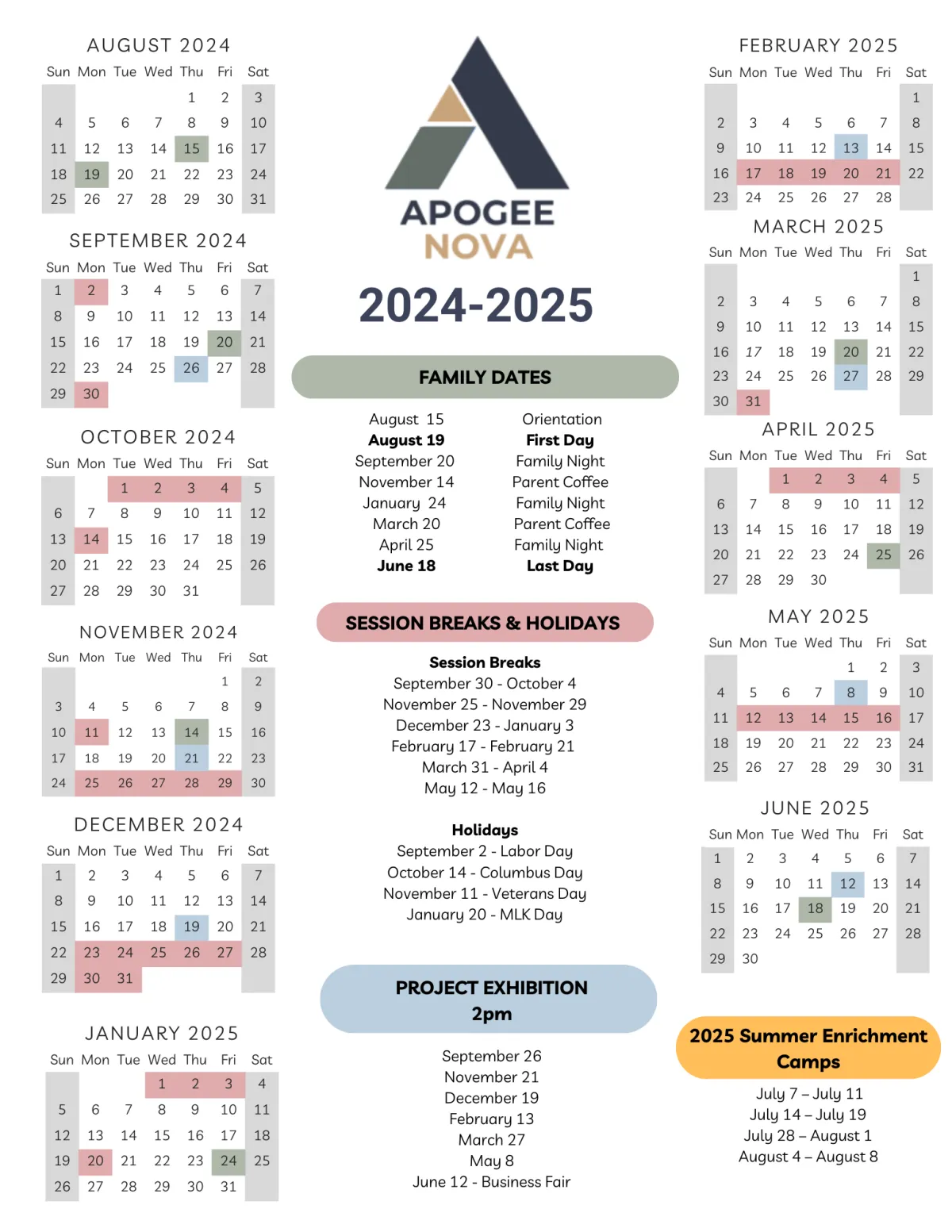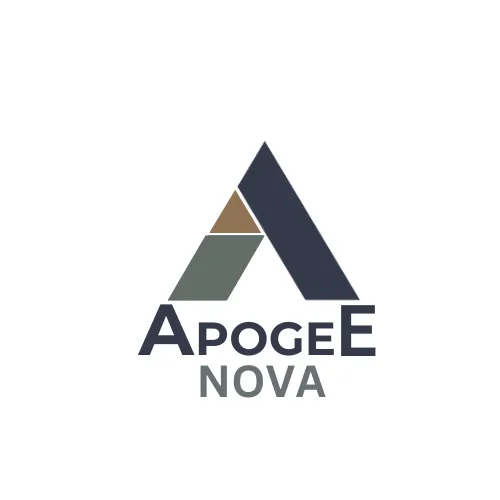The LEADERS Journey
We believe each of us has a special calling in life. a series of trials and tests must be faced with integrity and purpose to live a satisfying and fulfilled life. At Apogee NOVA, our mission is to prepare your child for his or her special journey.
Apogee nova 2024/2025 year

We operate on a 10-month calendar where LEADERS will experience 7 unique sessions lasting 3-6 weeks each. LEADER’s meet in CLASSes Monday-Thursday with varying experiences on Fridays including but not limited to field trips, enrichment workshops, individual study time, and parent connection.
A Typical Day at Apogee nova
8:30 - 9:00am = Arrival/Free Play.
9:00 - 9:30am = Morning Huddle (set intentions, daily gratitude, goals/objectives of the day).
9:30 - 10:15am = Guided Fitness.
10:15 - 10:30am = Snack.
10:30 - 12:00pm = Core Academic Skills.
12:00 - 12:30 pm= Lunch.
12:30 - 1:00pm = Free Play/Outdoor Time.
1:00 - 2:30pm = Socratic Discussions and Project Based Learning
2:30 - 3:00 pm= Clean up/Closing Huddle.
Benefits of our flexible design:
Creates rhythm and boundaries for projects.
Promotes opportunity for increased family time and travel.
Allows for students to have extended breaks throughout the year and maintains their interests and retention by shortening the summer break.
Promotes rest and integration as a foundational component of learning and growth.
Allows the Apogee NOVA team to receive and incorporate feedback between sessions.
Our days are a mix of routines that provide both focus and freedom.
We keep our program fun and engaging as we introduce age-appropriate rigor, promoting joyful growth that our learners want to keep coming back for!
We foster an environment that will cultivate their mind, body, soul and spirit.
We create excitement with field trips, real-life learning experiences, and exhibitions of work throughout the year.
movement is life
Children need hours of play per day.
Attention and Cognitive Abilities: When allowed to enjoy free play, children pay more attention to academic tasks.
Creativity: play promotes problem-solving and creativity in children. When left to their own devices, children can be incredibly creative with whatever is in their environment. With the introduction of unstructured play outside, children are able to use their imaginations more freely. For example, natural loose materials such as sticks, stones, sand and plant materials can transform into something completely different in the hands of children.
Stronger Verbal and Social Skills:
Research suggests that outdoor play can encourage better impulse control and reduce aggression in children, which leaves room for better social interactions and improved verbal skills. Part of the factors that affect a child’s social skills is exercise. As mentioned above, outdoor environments encourage exercise in children, which in turn increases blood flow to the brain and stimulates neurotransmitters that are needed for learning and attention, as well as improved mood. By positively affecting a child’s mood, children are more easily able to interact with each other in constructive and collaborative ways, with reduced aggression and increased happiness.
intentionality
Overall development in the areas of social, emotional, cognitive, language, and physical growth is affected by the relationships children have with others in their lives.
To learn, children need opportunities to engage in meaningful activities that support development, such as play and interactions with adults and others. Interactions include how an educator approaches, responds to, communicates with, and supports children in all areas of learning.
Intentional interactions happen when a coach carefully thinks about how they approach and respond to children.
Apogee Nova coaches support children's development when they have reciprocal, or back and forth interactions and conversations with children throughout the day. Together, they talk, share, listen, and learn. This is the foundation of Socratic Discussions.
These interactions become a platform to boost language, and to help children connect to new ideas and develop new skills. This means that Apogee Nova coaches think carefully about how they intentionally interact with children to boost thinking skills and nurture positive learning experiences. The coaches intentionality is a key factor in providing quality interactions for children.
core academic skills
Mastery of the core academic skills of: Math, Science and Engineering, Arts and Humanities, Reading and Language Arts are vital here at Apogee Nova.
In addition to the Core Academic Skills, we also focus on the items listed below.
Life Skills: This is a wide range of education from social skills, the power of negotiation, personal finances, personal responsibility, entrepreneurship, team building, communication, time management, goal setting and much more.
health is wealth
"It's no measure of health to be well adjusted to a profoundly sick society." - Socrates
Physical, Mental, and Emotional Health is a cornerstone here at Apogee Nova.
When these 3 aspects of our young learners are taken care of, the battle is half won. We have now set the stage for true education to start.
Eating healthy is the norm on our campus, and our staff WILL lead by example.
Having a Fit and Capable body is the foundation for self confidence.
Mental & Emotional Health: Creating environments that provide our learners the opportunity to experience age appropriate challenges and obstacles to overcome in a group setting builds resiliency, teamwork and leadership.
projects and experiences
“Education is the kindling of a flame, not the filling of a vessel.”- Socrates
One of the Main Pillars of our Education Model here at Apogee Nova is this. A great deal of time and effort goes into creating Projects and Experiences for our learners.
Every Friday we will organize an experience. An experience could range from a farm visit field trip to bringing in a first responder to teach first aid.
We learn the best by doing, by experimenting, by getting our hands dirty, by creating, by trying and failing, by collaborating with others to accomplish a common goal.
We are not "teachers" we are educators and facilitators...coaches.
We do not dish out data for our young learners to memorize and regurgitate, we create environments that inspire them to WANT to learn and understand more.
Education is not one's ability to memorize data for a test.
Education is your ability to go out into the world and be a good human, an effective human, a successful, self confident and capable human.
socratic discussions
“Strong minds discuss ideas, average minds discuss events, weak minds discuss people.” - Socrates
“Wonder is the beginning of wisdom.” - Socrates
“To find yourself, think for yourself.” - Socrates
Developed by the Greek philosopher, Socrates, the Socratic Method is a dialogue between coach and learner, instigated by the continual probing questions of the coach, in a concerted effort to explore the underlying beliefs that shape the learners views and opinions.
Socratic inquiry is not “teaching” per se. It does not include PowerPoint driven lectures, detailed lesson plans or rote memorization. The learners are not passive recipients of knowledge.
The Socratic Method involves a shared dialogue between the coach and learners. The coach leads by posing thought-provoking questions. Learners actively engage by asking questions of their own. The discussion goes back and forth.
The aim of the questioning is to probe the underlying beliefs upon which each participant’s statements, arguments and assumptions are built.
The coach does not have all the answers and is not merely “testing” the learners. The questioning proceeds open-ended with no pre-determined goal.
The focus is not on the learners statements but on the value system that underpins their beliefs, actions, and decisions. For this reason, any successful challenge to this system comes with high stakes—one might have to examine and change one’s life, but, Socrates is famous for saying, “the unexamined life is not worth living.”
leadership
We build Leaders.
Leaders provide direction and vision, motivate and inspire others, and help create an environment conducive to success by promoting communication and collaboration among team members. In short, leadership and strong management are essential for anyone that wants to achieve their objectives.
Because we have mixed age classes, and do not separate our learners by age group, they have the opportunity to practice leadership and mentorship to the younger learners.
In traditional education models there is very little, if any, opportunity to lead or mentor. We start this process early.
Personal Responsibility: every learner will have responsibilities and roles here on campus. Our aim is to model actual life as closely as possible and prepare our learners to be successful before they step out into the world.
Traits of a good leader are: Decisiveness, Trustworthiness, Empowerment of others, Clear communication, Resilience.
community
Community is defined as “a feeling of fellowship with others, as a result of sharing common attitudes, interests, and goals.”
For children, a sense of community brings connection both to their surroundings and the individuals in those surroundings — further connecting them to their own unique place in the world.
Community involvement and engagement produces long-term benefits in their lives. It gives them a sense of belonging and is crucial to the building of their identity.
Community involvement sends a powerful message to children. It’s one that says you are important. You are loved. You belong. And it’s a message that, with it, holds the strength to empower every child in the world.
A strong community helps build self esteem. Children with high self-esteem and a positive self-image feel capable, accepted, and encouraged. A positive sense of self is one of the greatest gifts you can give your child and helps them develop into happy, productive people.
Strong social connections can also boost your child’s confidence and lead to new friendships.
CONNECT WITH US TODAY!
THE PHILOSOPHY
GET INSPIRED
“It is hard to fail, but it is worse never to
have tried to succeed.”
–Theodore Roosevelt-




Facebook
Instagram